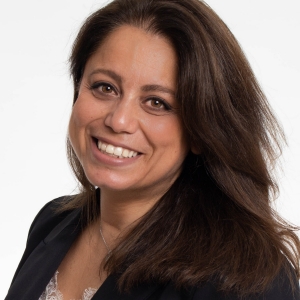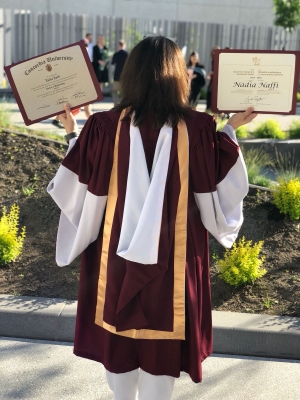Nadia Naffi, MA 12, PhD 18, wants us to take artificial intelligence (AI) very, very seriously. An assistant professor of Educational Technology, and chair in Educational Leadership in Innovative Pedagogical Practices in Digital Contexts – National Bank at Université Laval in Quebec City, Naffi considers the deepfake videos spreading on social media a sign of ugly things to come.
“We’re reaching a place where it’s very difficult to know what is real and what is not,” she says. “In the past, we knew that if we saw a video, it was real. Now we can’t even rely on our own eyes because it could be created by AI.”
As much as her research has focused on examining the ethical and responsible use of AI and social media, and highlighting the dangers of AI offshoots such as deepfake videos, Naffi is also conducting research on the positive implications of AI tech for education.
Those include the ways in which the health-care industry should adopte AI to enhance practitioners' skills, enabling them to work alongside technology for more efficient and effective patient care. In her research at CHUM, specifically with the Direction de l'Enseignement et de l'Académie (DEAC) and the School of Artificial Intelligence in Healthcare (SAIH), Naffi investigates the most effective training methods for staff on integrating AI applications with healthcare education..
“AI is being integrated in the medical space and my partnership with the DEAC aims to ensure there is lifelong learning happening here in leveraging its benefits for doctors, nurses and all medical and technical staff,” she says.
Bracing for the potential impacts of AI in education, training, talent development, and the upskilling and reskilling of current and future employees is a key motivation for Naffi. “If we don't experiment with AI in the workforce, and we don't see where we can actually use it in a responsible and ethical manner, we won't be able to make smart decisions about how these tools can really help us and optimize our performance,” she says.
Naffi also feels compelled to educate youth about the implications of AI. In a recent study she conducted with her youth on deepfakes, students created their own manipulated videos to demonstrate the dangers (and how simple it can be), while also sharing some recommendations in a piece for The Conversation and an article published in the Journal of Constructivist Psychology
From Lebanon to Montreal
Naffi grew up in Beirut, where she spent her childhood hiding from sniper fire and car bombings. “I remember being a kid there, always making sure I was safe,” she says.
In early adulthood, she worked as an interior designer but soon fell in love with teaching. After marrying in 2008 and having three children, she and her family decided to leave for Canada and, having been fluent in French since she was a child, Quebec felt like a comfortable choice.


 “If we don't experiment with AI in the workforce, we won't be able to make smart decisions about how these tools can really help us and optimize our performance,” says Nadia Naffi.
“If we don't experiment with AI in the workforce, we won't be able to make smart decisions about how these tools can really help us and optimize our performance,” says Nadia Naffi.
 Naffi pictured with her Concordia PhD and Governor General’s Academic Medal certificates at graduation in 2018.
Naffi pictured with her Concordia PhD and Governor General’s Academic Medal certificates at graduation in 2018.